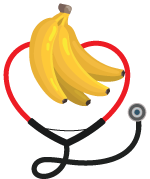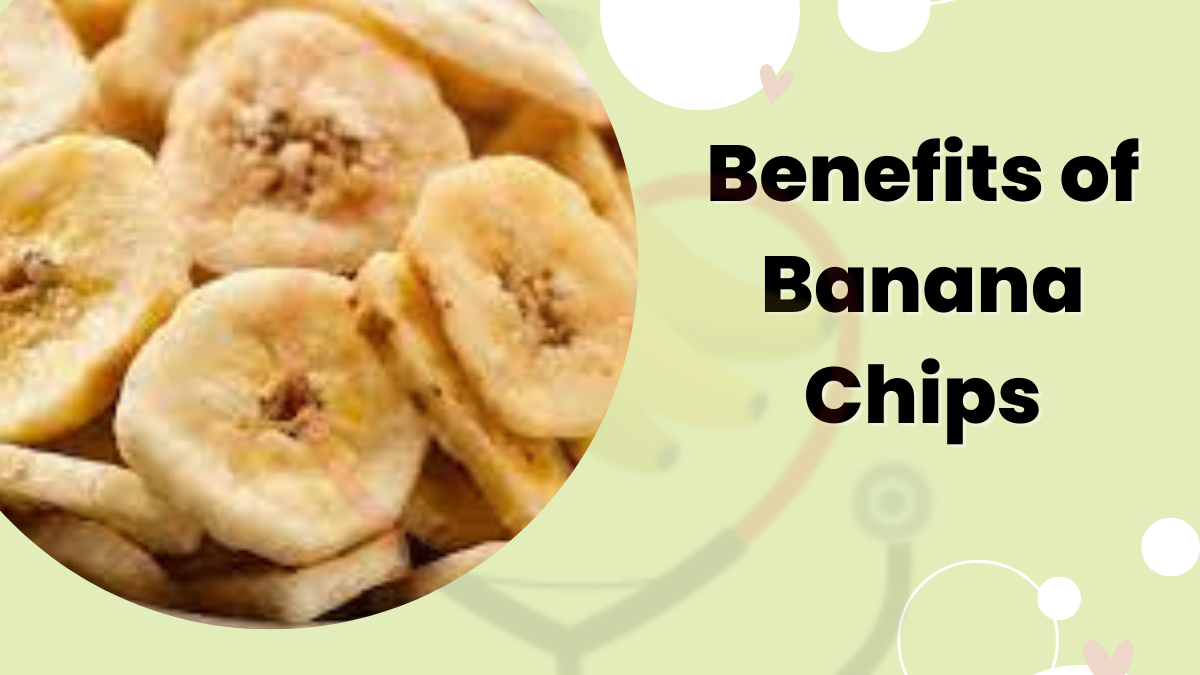Banana chips are thin slices of bananas that are fried, baked, or dehydrated until crispy. They can be made at home or bought at the store, and they come in different flavors and textures. They can be made tastier by adding sugar, honey, syrup, salt, or spices. However, raw bananas are both delicious and healthy.
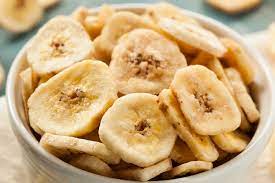
Health Benefits of Banana Chips
Banana chips offer several health benefits, including:
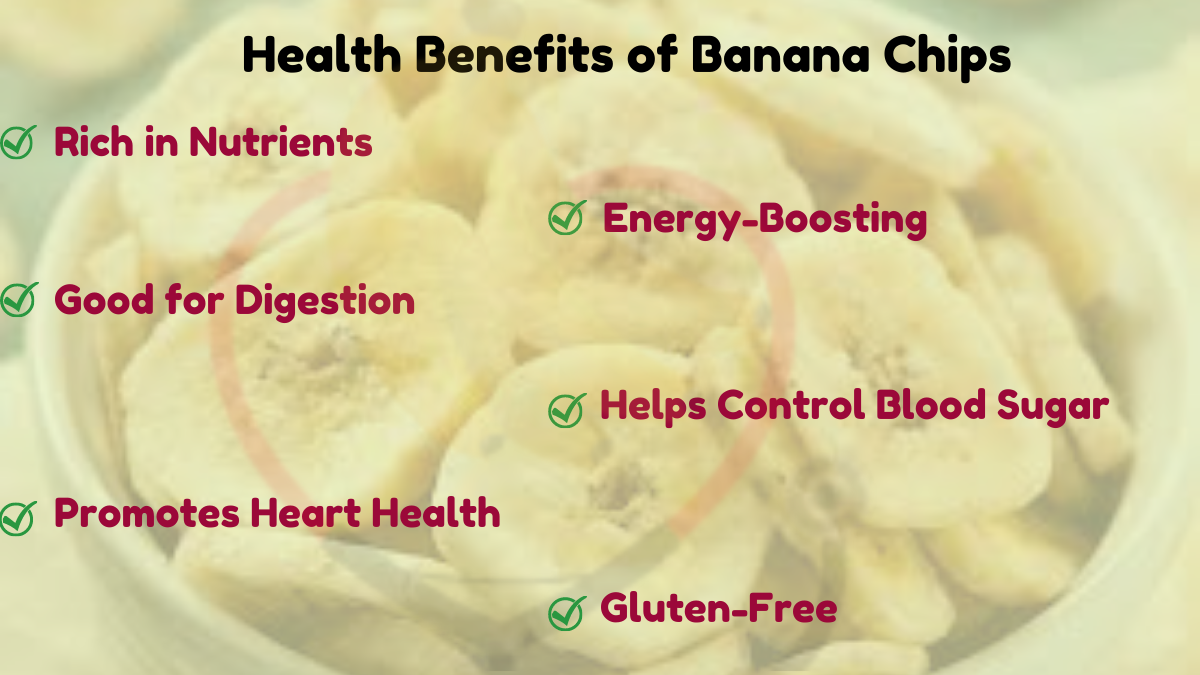
1: Rich in Nutrients
Bananas are packed with essential nutrients, such as vitamins B6 and C, potassium, magnesium, and fiber. [1]
According to USDA, 100g of banana chips contains:
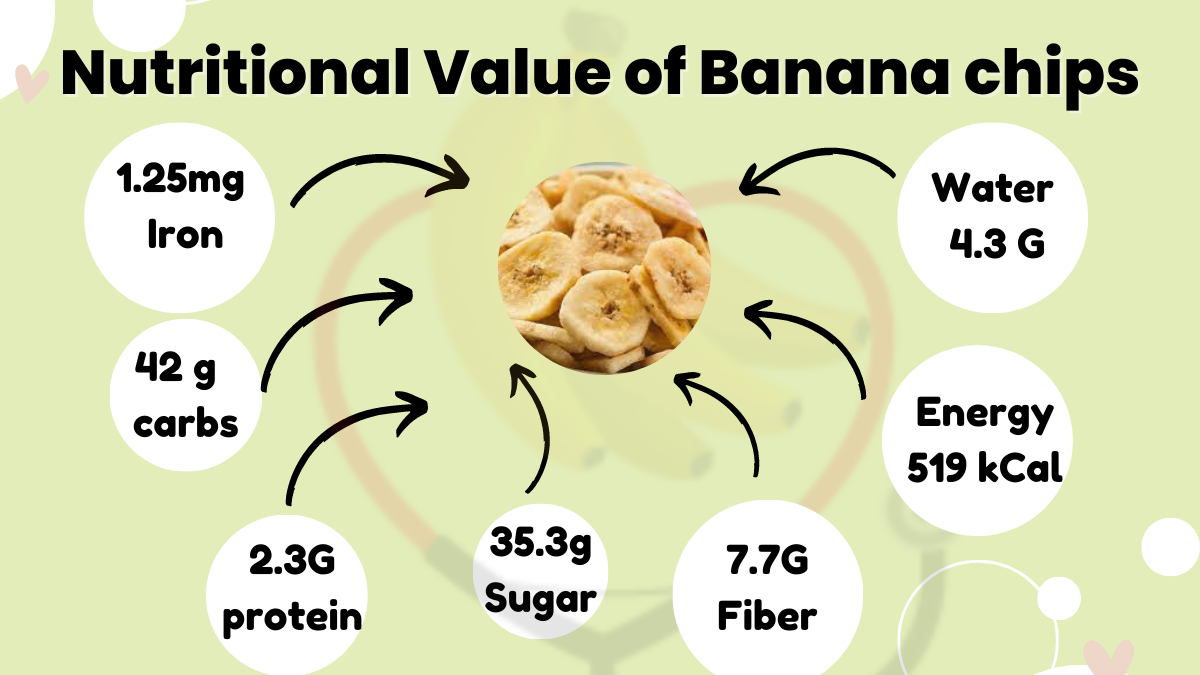
- Water: 4.3 g
- Energy: 519 kCal
- Protein: 2.3 g
- Carbohydrates: 42 g
- Total lipid (fat): 33.6 g
- Fibre, total dietary: 7.7g
- Sugar: 35.3g
- Calcium, Ca:18 mg
- Iron, Fe: 1.25 mg
- Phosphorus, P: 56 mg
- Potassium, K: 536 mg
- Sodium, Na: 6 mg
- Zinc, Zn: 0.75 mg
- Copper, Cu: 0.205 mg
- Manganese, Mn:1.56 mg
2: Energy-Boosting
Banana chips are a great source of energy, thanks to their high carbohydrate content. Carbohydrates are the primary source of fuel for your body and brain, and eating banana chips can give you a quick burst of energy when you need it.
3: Good for Digestion
Bananas are rich in fiber, which is essential for digestive health. Fiber adds bulk to your stool and promotes regular bowel movements, preventing constipation and other digestive issues. Eating banana chips can help you meet your daily fiber needs and support a healthy gut.
4: Helps Control Blood Sugar
Bananas have a low glycemic index, which means they do not cause a sudden spike in blood sugar levels. This makes them a good snack option for people with diabetes or those trying to manage their blood sugar levels. Banana chips made with no added sugar or sweeteners are the best option for this purpose.
5: Promotes Heart Health
Bananas are rich in potassium, a mineral crucial in regulating blood pressure and reducing the risk of heart disease. Eating banana chips regularly can help maintain healthy blood pressure levels and improve heart health.
6: Gluten-Free
Banana chips are naturally gluten-free, making them an excellent snack option for people with celiac disease or gluten intolerance. However, be sure to check the ingredients label of store-bought banana chips, as some brands may add gluten-containing ingredients.
How to make Banana Chips?
There are different ways to make banana chips, but the most common methods include:
Deep frying: The banana slices are deep-fried in oil until crispy and golden brown. This method is quick but adds extra calories and fat to the chips.
Baking: The banana slices are baked in the oven until they dry out and become crispy. This method is healthier but takes longer and may result in less crispy chips.
Dehydrating: The banana slices are dehydrated in a dehydrator or an oven at a low temperature until they lose most of their moisture and become crunchy. This method preserves the nutrients in the bananas and creates a healthier snack.
How to Incorporate Banana Chips into Your Diet?
Banana chips can be a tasty and nutritious addition to your diet, but they should be consumed in moderation due to their high calorie and fat content. Here are some ideas on how to incorporate banana chips into your diet:
Snack on them: Banana chips make an excellent snack between meals, providing a quick energy boost and satisfying your sweet or savory cravings. However, be mindful of the portion size, as too many banana chips can add up calories and fat.
Add them to your breakfast: You can sprinkle banana chips over your oatmeal, yogurt, or smoothie bowl to add some crunch and sweetness to your breakfast.
Use them as a topping: Banana chips can be used as a topping for ice cream, pancakes, or waffles, adding a tropical twist to your desserts.
Mix them with nuts and dried fruits: You can create your own trail mix by mixing banana chips with nuts, such as almonds, cashews, or peanuts, and dried fruits, such as raisins or cranberries. This snack is perfect for outdoor activities or long hikes.
Banana chips are a delicious and nutritious snack that offers several health benefits. They are rich in essential nutrients, energy-boosting, good for digestion, help control blood sugar, promote heart health, and gluten-free.
They should be consumed in moderation due to their high calorie and fat content. By incorporating banana chips into your diet in a mindful way, you can enjoy their tasty and beneficial qualities.
FAQs
Are all banana chips gluten-free?
Most banana chips are naturally gluten-free, but it is always important to check the ingredients label of store-bought brands, as some may add gluten-containing ingredients.
How many banana chips should I eat in a day?
The recommended portion size for banana chips is around 30g, which is about a small handful. Consuming too many banana chips can add up calories and fat, leading to weight gain and other health issues.
Can I make my own banana chips at home?
Yes, you can make your own banana chips at home by slicing ripe bananas thinly and baking them in the oven or dehydrating them. This way, you can control the ingredients and make a healthier version of banana chips.
Are sweet or savory banana chips healthier?
Both sweet and savory banana chips can be healthy, depending on the ingredients and the method of preparation.
